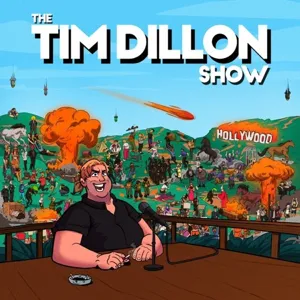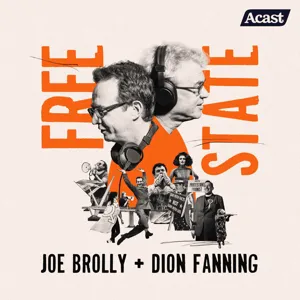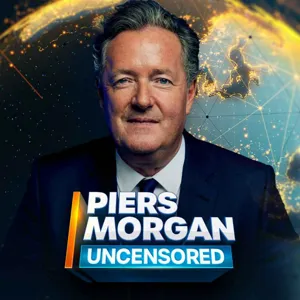Podcast Summary
Educate Yourself on Global Issues and Stand Up for Truth and Humanity: Being informed about global issues and standing up for truth and humanity, no matter where it's happening, can impact our own lives and communities. Recognize and address instances of injustice and oppression to contribute to positive change.
It's crucial to be informed about global issues and stand up for truth and humanity, no matter where it's happening. The speaker shares her personal connection to the ongoing conflict in Palestine and encourages listeners to educate themselves on the history and realities of the situation. She emphasizes that what happens in other parts of the world can still impact our own lives and communities. The speaker also highlights the importance of recognizing and addressing instances of injustice and oppression, whether it's happening in Palestine or in our own backyard. By being informed and taking action, we can help raise awareness and contribute to positive change.
Exploring complex global issues: Palestine and Israel: Recognize historical context and power structures to form informed perspectives on global conflicts. Learn from multiple, unbiased sources to contribute to humanity and address injustices.
Understanding complex global issues, such as the conflict between Palestine and Israel, requires recognizing the historical context and the systems of power that shape them. The speaker shares her personal connection to the issue through her Palestinian family and encourages learning from multiple, unbiased sources to form a well-informed perspective. It's essential to acknowledge that these conflicts don't start from scratch but are built on past events and power structures. By gaining knowledge and being confident in our convictions, we can contribute to demonstrating humanity and addressing injustices, both locally and globally.
Understanding the Nakba and its impact on Palestinians: Examining historical events from the perspectives of those directly affected can help bridge gaps and foster meaningful conversations about complex conflicts like the one between Palestine and Israel.
Conflicts, such as the one between Palestine and Israel, are complex and require a nuanced understanding. Many people involved believe they are victims, making it essential to examine both sides. The Nakba, or "great catastrophe," refers to the displacement of approximately 700,000 Palestinians in 1948. Families like the speaker's, who are from the beautiful and strategic region of Yaffa, were forced to flee due to violence. The Nakba was not a temporary situation; instead, it marked the beginning of a long-lasting conflict. Understanding historical events from the perspectives of those directly affected can help bridge gaps and foster more meaningful conversations.
Palestinians forced from homes during Israeli state formation: During the creation of Israel in 1948, around 700,000 Palestinians were displaced due to violence and lack of weaponry, leaving them unable to defend their homes. Symbols like keys to former homes represent the loss and displacement.
During the formation of the Israeli state in 1948, Palestinians were displaced due to escalating aggression and violence towards civilians. My family's story is an example of this, as they were forced to leave their home temporarily with the belief they could return, but were ultimately barred from doing so. This mass displacement, known as the Nakba, saw around 700,000 Palestinians leave their homes. The lack of weaponry for Palestinians, combined with the British support for Israeli forces, created an uneven power dynamic that made self-defense difficult. The keys to their former homes remain a symbolic reminder of the displacement and loss experienced by Palestinians.
Palestinian families' connection to their homeland through the Palestinian passport: Despite political conflicts and displacement, Palestinian families have endured and maintained their bonds, demonstrating resilience and determination to rebuild their lives and preserve their heritage.
The Palestinian passport, a family heirloom, holds deep historical significance for many families, representing a connection to their homeland and heritage. During the 1940s and 1960s, due to political conflicts, many Palestinians were forced to leave their homes and became refugees. Some traveled through Gaza, which was occupied by Egypt at the time, while others went to Egypt and eventually settled in refugee camps. The experiences of these families highlight the complex history and ongoing challenges faced by Palestinians, and the importance of acknowledging their right to live freely and peacefully alongside others in the region. The story of one family, in particular, involves a young boy named my grandfather, who left school at age 12 to work in a mechanic shop, and later followed his future wife's family to Egypt. Despite the hardships they faced, their strong bond and determination to be together ultimately led them to build a loving and enduring marriage.
Family's role in shaping our lives and decisions: Family's concerns for our well-being and security can significantly impact our marriage and life choices. Preserving cultural heritage is important for maintaining a connection to our past and identity.
Family plays a significant role in shaping our lives and decisions, especially during challenging times. The story shared illustrates how a young woman's marriage was influenced by her father's concerns for her well-being and security. The family's transition to Kuwait was also influenced by their heritage and history, which was intertwined with the land they once called home. The loss of their physical belongings and the destruction of their community served as a painful reminder of the past, but their resilience and determination to preserve their history continued through their family line. The importance of preserving cultural heritage and the impact of historical events on individuals and families is a poignant reminder of the interconnectedness of our past and present.
Oppression and identity erasure in Palestine and America: Historically, attempts have been made to erase indigenous and non-white identities, but efforts like NPR's 'Black Stories, Black Truths' uplift and empower voices, while struggles for Palestinian and black rights remain interconnected.
Oppression and erasure of identity are not unique experiences, as discussed in relation to Palestine and the black community in America. The suppression of remembering and acknowledging past struggles and experiences is a methodology of colonization. McDonald's, on the other hand, is celebrated for staying true to its chicken roots. In the media sphere, NPR's "Black Stories, Black Truths" collection uplifts and empowers black voices, providing a platform for diverse perspectives and experiences. Historically, attempts have been made to erase indigenous and non-white identities through assimilation and forced assimilation, as seen in the treatment of Native Americans and Aborigines. The ongoing struggles for freedom and recognition of black lives and Palestinian rights are interconnected, as they both involve the suppression of identity and history.
Forced displacement and dispossession in South Africa and Palestine: Both South Africa's apartheid and the Palestinian-Israeli conflict involve forced displacement and dispossession of indigenous people, with historical and current systemic racism and colonialism playing significant roles.
The historical and current issues of systemic racism, colonialism, and ethnic cleansing, as seen in the cases of South Africa's apartheid and the Palestinian-Israeli conflict, are deeply interconnected. Both involve the forced displacement and dispossession of indigenous people from their lands. South Africa's apartheid regime studied racism in other countries, including Germany and the United States, and implemented similar policies. Israel, too, has annexed Palestinian land over the past 50 years, leading to a fragmented Palestinian territory surrounded by Israeli settlements. Critics may bring up Hamas, a militant group in Palestine, but the lack of a Palestinian government and state makes it a complex issue. The root cause of the problem is the occupation and oppression of the Palestinian people. Hamas' extreme actions do not negate the underlying issue of Palestinian dispossession and the need for self-determination.
Misconceptions about the Israel-Palestine conflict: Despite the complexity of the Israel-Palestine conflict, everyone can educate themselves and form informed opinions by seeking out diverse perspectives and challenging misconceptions.
The ongoing conflict between Palestine and Israel is not a simple conflict with equal sides, but rather an occupation with deep historical roots and complex power dynamics. The use of tactics like division and separation have contributed to the creation of distinct identities and cultures within the separated areas. Another common misperception is that the situation is too complicated for individuals to understand, but with access to information and resources, everyone has the capacity to educate themselves and form their own informed opinions. It's important to challenge misconceptions and seek out diverse perspectives, such as those presented in NPR's "Black Stories, Black Truths" collection, which amplifies underrepresented voices and experiences. Ultimately, it's crucial to approach complex issues with an open mind and a commitment to learning and understanding.
The conflict's roots in colonialism and power dynamics: Americans can influence change by redirecting funding towards humanitarian efforts, debunking religious war myths, and focusing on humanitarian issues in Palestine
The conflict between Palestinians and Israelis is rooted in colonialism and power dynamics, with the US playing a significant role through funding and political support. This historical context shapes the current situation, which is not a religious war but a humanitarian crisis. The US's stance in this situation, as shown through its financial support, keeps the status quo and perpetuates oppression. The speaker encourages Americans to be aware of this and use their influence to redirect funding towards social services and humanitarian efforts instead. The historical presence of Jews in Palestine before the UN and British involvement also debunks the myth that this is a religious war. Instead, it's essential to focus on the humanitarian issues, such as the lack of basic necessities like food and healthcare for many Palestinians, particularly in Gaza.
Struggles for human rights in Palestine: Acknowledge daily struggles of Palestinians, promote equal rights, true democracy, and peace, and uphold universal human rights.
The situation in Palestine goes beyond religious conflicts and involves fundamental human rights issues. The speakers emphasized the importance of acknowledging the daily struggles Palestinians face in accessing basic necessities and their lack of representation in decision-making processes. They also highlighted the need for equal rights and true democracy, as well as the negative impact of fear and the misuse of religion as a tool to silence discussions on the matter. Additionally, the speakers expressed concern over the involvement of Western countries, such as the United States, in the situation, given their foundation on the separation of church and state. Ultimately, they called for a focus on upholding universal human rights and promoting peace and understanding between all parties involved.
Exploring Quality Fried Chicken and Amplifying Black Voices: McDonald's commitment to quality fried chicken and NPR's 'Black Stories, Black Truths' collection highlight the importance of recognizing and celebrating diverse experiences. McDonald's expertise in delivering delicious fried chicken and NPR's amplification of black voices offer unique perspectives and deeper understanding of the world.
McDonald's has a strong commitment to delivering quality fried chicken experiences, while NPR's "Black Stories, Black Truths" collection highlights and amplifies diverse black voices and experiences. McDonald's has a long history with chicken, and the Mcrispy offers a delicious example with its juicy, crispy texture and unbeatable pickle-to-chicken ratio. The brand's dedication to their product is evident, and they should be recognized for their expertise in the field. On the other hand, NPR's "Black Stories, Black Truths" is a powerful testament to the importance of centering black voices in storytelling. This collection showcases the unique perspectives and experiences of black individuals, offering a nuanced and authentic representation of the black community. By listening to these stories, we gain a deeper understanding of the complexities and richness of the black experience in America and beyond. Furthermore, it's crucial to recognize the parallels between historical events and current situations, such as the ongoing struggles in Palestine. By acknowledging these connections and amplifying underrepresented voices, we can foster a more inclusive and empathetic society. So, whether it's through enjoying a delicious piece of fried chicken or engaging with powerful storytelling, let's continue to support and uplift the diverse voices and experiences that make our world a richer place.
Understanding Historical Perspectives and Their Impact on Empathy: Acknowledging historical experiences can foster empathy and unity, while ignoring or downplaying them can perpetuate conflict and division.
Historical experiences shape people's perspectives and connections, and it's essential to understand the feelings and complexities behind the events. The speaker shares their personal connection to the Holocaust and how it has influenced their compassion for other oppressed communities, such as Palestinians. They emphasize the importance of acknowledging the feelings and experiences of those affected by historical events and how it can lead to empathy and unity. Furthermore, they discuss the complexity of social media and its potential to skew our perspectives due to algorithms and censorship. Ultimately, they encourage earnest efforts to learn from history and work towards positive change.
Normalizing the conversation around Palestine: Understand complexities beyond simplified narratives, take neutral stance against funding conflicts, educate yourself, and take action to promote normalization and neutrality.
We need to normalize the conversation around Palestine and take a neutral stance against funding conflicts. The speaker shares her personal experience of feeling silenced and erased due to the lack of acknowledgement and use of the word "Palestine." She urges people to do their research and understand the complexities of the situation beyond simplified narratives. The speaker also emphasizes the importance of taking action, such as removing funds from the conflict, to promote neutrality and normalize the conversation. The speaker draws parallels between the Palestinian experience and the experiences of marginalized communities, such as Black Americans, and encourages people to educate themselves and take a stand against injustice.
Supporting causes and businesses that align with our values: Put resources behind causes and stories that matter, deepen understanding of underrepresented cultures, and create spaces for underrepresented voices to be heard.
Supporting causes and businesses that align with our values is important to us, whether it's McDonald's commitment to chicken or NPR's dedication to amplifying Black voices. For McDonald's, their long-standing history with chicken proves their dedication, and their new offerings like the Mcrispy Chicken show they're not just talking the talk but walking the walk. Similarly, NPR's Black Stories Black Truths collection is a testament to the power of representation and empowerment, showcasing diverse and nuanced Black experiences that have often been overlooked in American storytelling. As individuals, we can make a difference by putting our resources behind causes and stories that matter to us, whether that's through financial support, following influential voices on social media, or simply listening and learning. And for those interested in deepening their understanding of Palestinian culture, consider checking out resources like the Traditional Palestinian Costume book or following Instagram accounts like Nina Tacori and Subitaha. Ultimately, it's essential to create spaces where underrepresented voices can be heard and uplifted, and we all have a role to play in making that happen.
Family bonds and lineage are deeply rooted and real: Acknowledge and celebrate family connections, create safe spaces for discussions, stand up against political oppression, educate oneself, engage in open conversations, and take action to address political injustices.
Family bonds and lineage are deeply rooted and real, transcending labels and complexities. The speakers in this conversation emphasized the importance of acknowledging and celebrating these connections, regardless of external factors. They also highlighted the need for creating safe spaces to discuss important issues and standing up against political oppression, drawing parallels between historical struggles for human rights and the ongoing situation in Palestine. It's crucial to remember that these issues are not about attacking individuals or religions, but rather addressing political injustices. Ultimately, educating oneself, engaging in open conversations, and taking action, such as removing financial support, are ways to make a difference.






